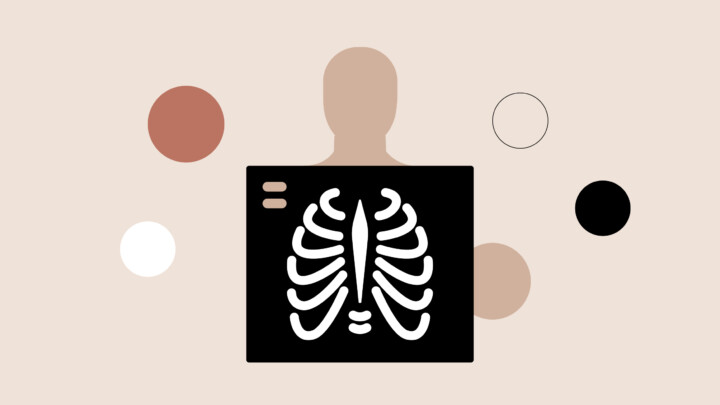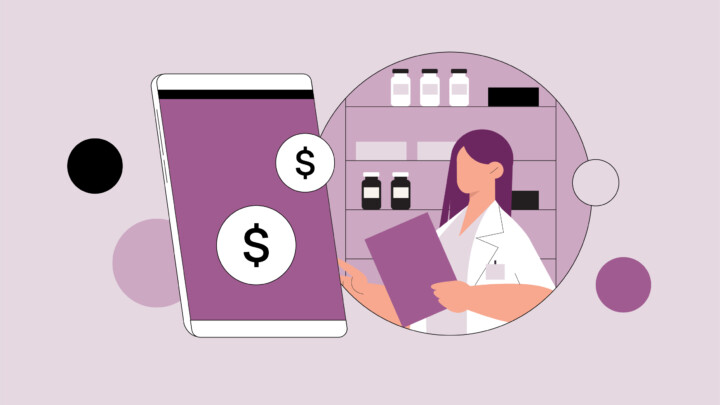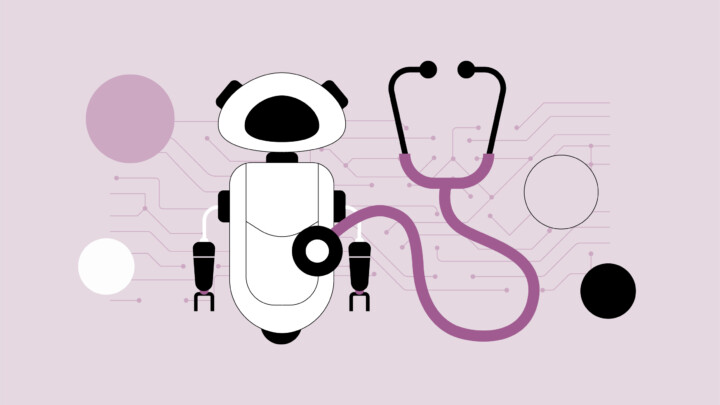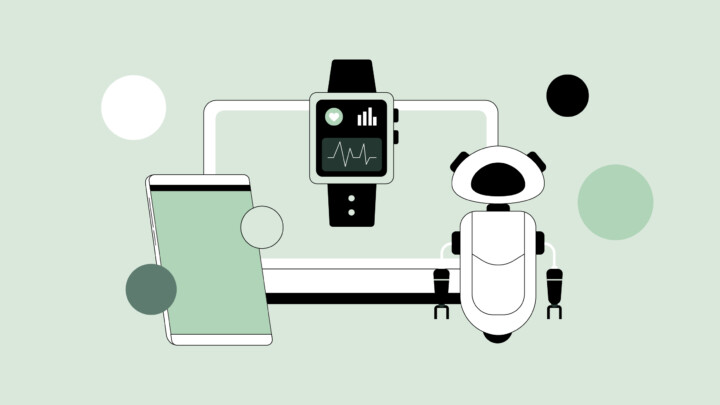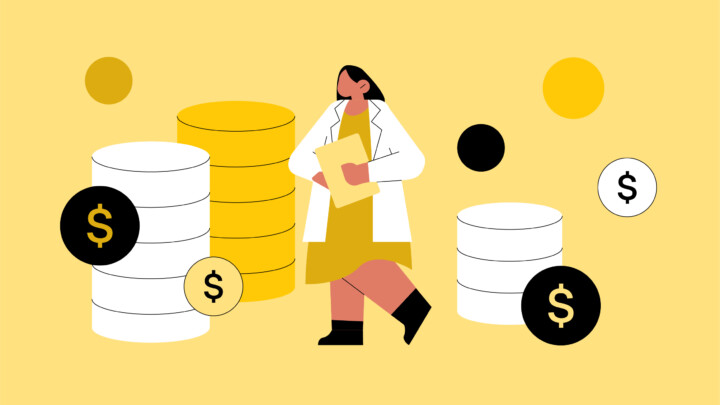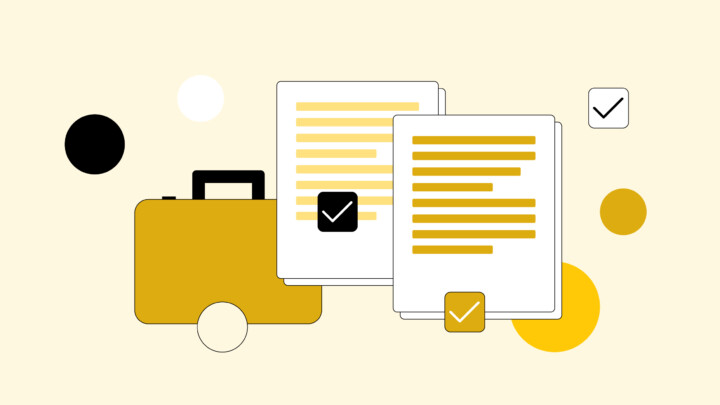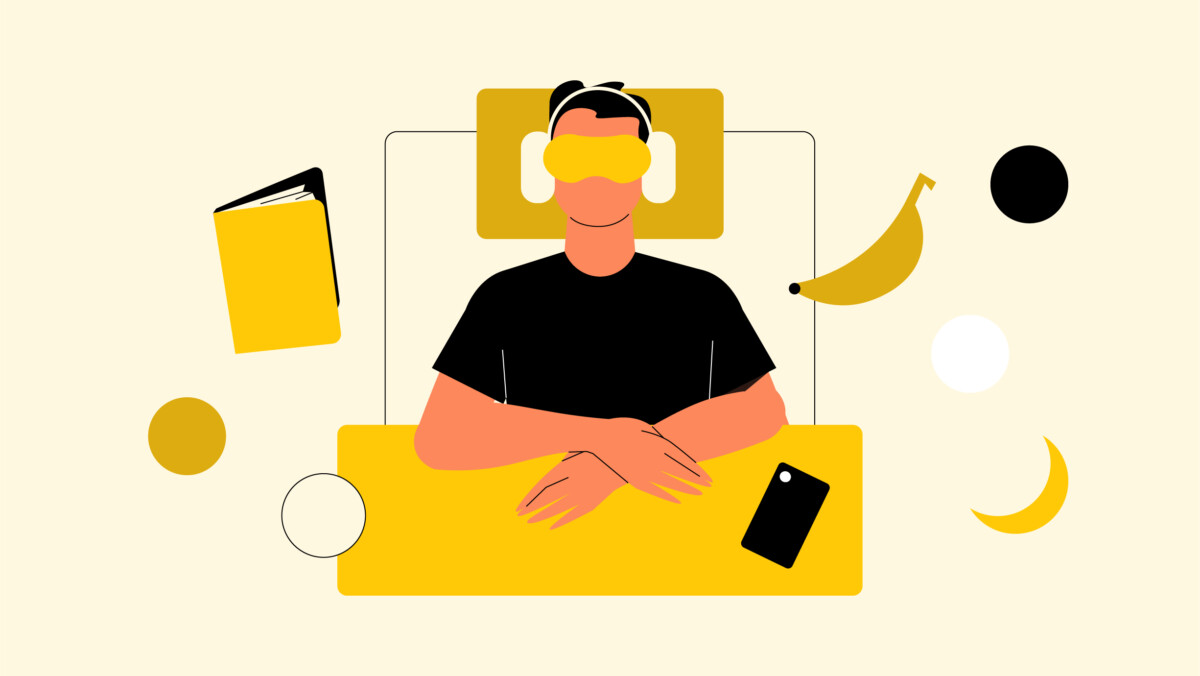
Due to the stress and constant challenges inherent in a career in the medical industry, many healthcare workers find it difficult to maintain a regular sleep schedule. The issues often start as early as in medical school. Studies have illuminated the prevalence of sleep issues among medical students, with a substantial portion of the population getting at least 30% less sleep than is commonly recommended.
The downstream effects of sleep deprivation can impact your health and performance during work hours, increasing the potential for burnout and preventable errors that leave patients worse for wear. To minimize the possibility of this occurring, physicians must do what they can to create and maintain a healthy sleep hygiene regimen. This article will explore how sleep quality can affect your physical and mental health, and provide a sleep hygiene checklist to help you consistently get the rest you need.
What is sleep hygiene?
Sleep hygiene is an all-encompassing term for a series of routines, behaviors, and environmental factors that help individuals get quality sleep. The exact amount of sleep each person needs on a nightly basis is influenced by age, current health status, and other personal details (The CDC offers general sleep recommendations for various age groups), but good sleep is a fundamental component of a healthy lifestyle. Proactively forming good habits to preserve high sleep quality gives your body the necessary time to repair and renew itself at the end of the day to improve your quality of life and enable you to be more effective as a physician.
The importance of quality sleep hygiene in medicine
All evidence confirms that a lack of sleep inevitably leads to negative outcomes. A study of 384 adults in Tabuk, Saudi Arabia found significant connections between poor sleep hygiene and sleep problems, severe daytime sleepiness, and depression at rates higher than those of other residents with better sleep quality.
The consequences of insufficient sleep can be especially harmful in a medical context. Per the Institute of Medicine, over a million injuries and over 50,000 deaths occur per year due to preventable medical errors, with poor sleep being one of the potential factors leading to said errors. Doctors and physicians are expected to work long, intense hours, especially at the beginning of their careers. Good sleep hygiene is often one of the first routines to fall by the wayside.
Of course, it is not fair to deem all medical errors an extension of diminished sleep habits, but research does demonstrate the value of a well-rested healthcare professional. A 2004 Harvard study found that hospitals could reduce the number of medical errors taking place in their facility by 36% if they limited doctor work shifts to 16 hours and the weekly work schedule to 80 hours at most, allowing more time for their physicians to rest.
Most physicians are aware that they are not getting enough shut-eye regularly. In a Sermo poll of our physician community members, only 38% of participants believed they got enough sleep. It is generally recommended that adults get between 7 and 9 hours of sleep a night, but many doctors struggle to reach that mark. A leading 37% of physicians in the Sermo poll estimate that they get 7 hours of sleep a night, followed by 30% getting 6 hours, and 18% getting 8 hours. This phenomenon is not just common among doctors, but also among their patients. 41% of those polled by Sermo said that sleep deprivation is common for their patients, and another 31% thought it was somewhat common. The hustle and bustle of daily life make it challenging for people from all walks of life to maintain a healthy work-life balance, but the benefits of good sleep practices are too widespread to ignore.
“Honestly, I think we underestimate how much good sleep does for us. I always tell my patients no pill can replace a good night’s rest. Over the years, I’ve seen that those who sleep well tend to cope better, heal faster, and just feel more like themselves,” said a GP contributing to the discussion in the Sermo community. “My advice? Keep a regular bedtime, avoid your phone an hour before sleep, and find something relaxing like music or reading to help you wind down. It’s not about being perfect every night, but making sleep a priority really pays off.”
How to improve your sleep hygiene as a physician working long hours
Sticking to a consistent sleep schedule isn’t always realistic for physicians given the irregular hours that often come with the role. But there are still some methods you can follow to achieve healthy sleep. Here are some strategies you can use to improve your sleep hygiene (without taping your mouth shut):
Keep a sleep diary to identify possible obstacles
Sleep quality is a journey as much as it is a destination. You don’t need to have your sleep routine perfectly optimized immediately, and it may take time to find the formula that makes sense for your lifestyle. Maintaining a sleep diary helps you quantify each step of your routine, detail each variable, and evaluate how they affect your sleep over a period of time. When physicians discuss how to treat sleep-deprived patients, the same advice applies to themselves. “I need to understand what has disrupted the sleep pattern and, starting from that, I can try to optimize pharmacological and alternative treatments,” concurred a practitioner of internal medicine. Using a wearable health device in conjunction with your sleep diary can give you actionable data with the context to make changes if needed.
Create a sleep sanctuary
Organizing your living space to craft an environment where you can sleep comfortably is key to improving sleep hygiene. Making intentional choices about the layout and use of your bedroom makes it an easier place to rest. You can create a sleep sanctuary by:
- Keep the room dark or purchase blackout curtains, shades, or eye masks to block out light
- Replace your mattress or pillows if they get too old
- Enforce boundaries that keep work and most forms of entertainment out of the bedroom
- Keep the room temperature between 65 and 70 degrees Fahrenheit to help you relax
- Maintain a space for your children or pets to sleep elsewhere
Create a relaxing bedtime routine
Having a wind-down period at the end of the day helps to decompress before going to bed. Limiting the use of electronic devices, reading physical books, or engaging in a calming stretching exercise, such as yoga, are great ways to relax and improve your sleep quality.
Prioritize sleep
As tempting as it can be to watch one more episode of your favorite show or get caught up in doomscrolling social media feeds, these and other activities actively get in the way of good sleep. It’s easier said than done, but avoiding things that make you anxious or overly stimulated before bedtime is an immediate way to demonstrate to yourself that sleep quality is an important aspect of your life. You can also commit to going to sleep and waking up at a similar time each day.
Don’t overdo it with naps
A late afternoon nap may feel good in the moment, but it can also make it harder to sleep at your normal bedtime. If you want to take a nap, it is recommended that they don’t exceed half an hour in length and don’t take place too late in the day.
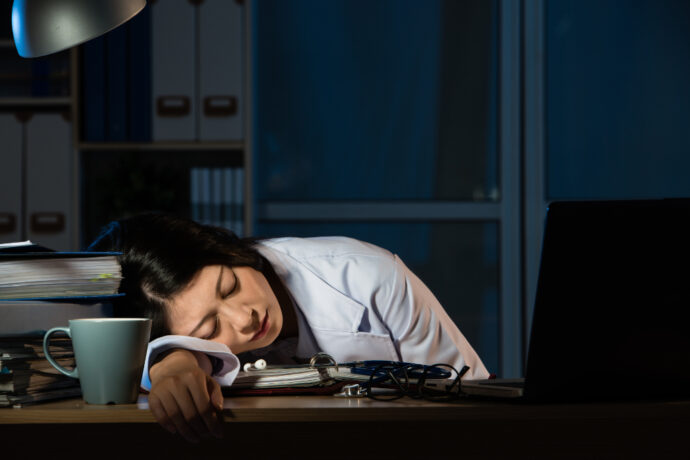
Cut down on stimulants in the afternoon and evening
Caffeine is a useful stimulant in the early hours of your workday, but it can cause problems falling to sleep if ingested later on. A systematic review found that caffeine consistently prolongs sleep latency, reduces total sleep time and sleep efficiency, and worsens perceived sleep quality. Objective measures show caffeine reduces slow-wave sleep and EEG slow-wave activity, while increasing wakefulness, arousals, and stage-1 light sleep. Avoid consuming any beverages with a significant amount of caffeine in the late afternoon or evening.
Nicotine and alcohol are other stimulants that should be avoided closer to bedtime. While alcohol is a natural depressant, its intake should also be minimized as it can worsen snoring and reduce the amount of REM sleep you get in a night, substantially worsening your sleep quality.
The timing of your meals can also affect your body’s ability to ease into sleep. Dinner should take place at least three hours before bedtime to decrease the risk of digestive activities keeping you up at night.
Drown out noise
Sound is a common impediment to restful sleep. 53% of physicians polled by Sermo preferred silence as they fall asleep. Closed windows and heavy curtains can tamp down some outside noise, but total quiet is a privilege not everyone can afford.
Music therapy incorporates specific songs as a reparative tool, and there are other established methods of using sound to drift smoothly into sleep. 15% of participants in the Sermo poll sleep to the sounds of their TVs, while white noise machines (used by 10% of physicians) are another popular way to mask excess noise in your bedroom, although research is mixed on their effectiveness. “It is hard to get sleep when on call overnight at home and getting woken up from calls in the hospital. I also have 2 young children, which causes me to be awake overnight. I have found that white noise on during sleep is very helpful,” endorsed an OBGYN in the US. Podcasts (6%) and audiobooks (5%) are also used by some physicians on Sermo as a sleep aid.
The effects of poor sleep quality
Everyone has felt groggy and tired after a night of poor sleep, but sleep deprivation can negatively affect a person in many other ways. As you sleep, your body restores itself so that you are mentally sharp and fully functional the next day. Extended bouts of poor sleep can be very damaging to your health. We asked physicians on Sermo to name the most surprising symptoms of sleep deprivation. Here is their list, ranked from most to least surprising:
Headaches (20%)
Research has confirmed a strong connection between sleep deprivation and headaches and migraines. Less REM sleep means your brain doesn’t have the time to rest and repair itself, which decreases your neural plasticity. Poor sleep quality can lead to different types of headaches, meaning symptoms may change from person to person. There is also evidence that lack of sleep reduces the physical pain threshold, making the effects of sleep deprivation headaches even more intense.
Poor decision-making (19%)
A lack of cognitive clarity is synonymous with insufficient sleep. If your brain is fatigued, then you will be less alert and are more likely to make suboptimal choices throughout the day, increasing the risks of damaging mistakes. Juggling several tasks at once is also much more difficult if you are sleep-deprived.
Mood swings (18%)
Changes in season already have an impact on the mood of many individuals; but low sleep quality can make it more difficult to exhibit healthy emotional regulation, leaving you more vulnerable to mood changes and other mental health issues. An inability to properly handle your emotions can also create a negative cycle where your emotions make it harder to go to sleep, which then leads to more emotional instability.
Reduced coordination (15%)
The cognitive impairments that affect your mind also affect your ability to control your body. Sleep deprivation makes it harder to focus and decreases your reaction time to stimuli.
Increased appetite and cravings (14%)
Sleep plays an important role in regulating your metabolism and appetite, although the full extent of the dynamic is yet to be discovered.
“The relationship between metabolic syndrome and sleep disorders is complex and not yet fully understood. A bidirectional relationship between the two is proposed, according to which obesity and insulin resistance play an important role, such that obesity and disorders such as obstructive sleep apnea syndrome mutually promote its progression and severity,” explained a doctor of occupational medicine on Sermo. “Studies indicate that sleep deprivation or lack of sleep can modulate various neurohumoral pathways, activate proinflammatory and sympathetic responses, and promote oxidative stress, all of which are common cascades in the pathogenesis of cardiometabolic diseases.”
Gastrointestinal issues (11%)
Poor sleep quality is also linked to GI problems such as increased gut inflammation, hormonal disturbances, and alterations to your gut microbiome. These symptoms can cause abdominal pain, diarrhea, nausea, and worsen IBS.
It’s easy to take sleep for granted as one of the most basic functions of the human body. 87% of physicians who participated in the Sermo poll agreed to some extent that sleep is often viewed as a luxury (49% agreed, 25% strongly agreed, and 23% somewhat agreed.) But failing to get enough sleep doesn’t just leave you a little tired the next day. It degrades your health on every level.
The impact of bad sleep is magnified in an industry where your attention to detail, mental acuity, and emotional intelligence are constantly put to the test. Wellness initiatives aren’t just for patients – their doctors should also take part. Physicians have a moral and professional responsibility to take care of themselves to ensure that they can provide safe care to their patients and maintain their personal career growth. A rested healthcare workforce is smarter, more resilient, and better prepared to take on the challenges of the profession.
Is sleep medication a good option for improving sleep hygiene?
Doctors can prescribe sleep aid drugs to help combat short and long-term symptoms of excessive sleep deprivation. Over-the-counter medications and dietary supplements are non-prescription means of medically addressing sleep issues. Most sleep aids work by creating a sedative effect that induces a person to fall asleep or stay asleep for an extended period.
Sleep aids offer a quick fix to reset your sleep schedule and can alleviate various issues related to sleep deprivation. However, it is important to remember that they are not meant for long-term use. Weariness over sleep aid users developing a dependency on these substances is a real obstacle for many physicians. 35% of physicians polled on Sermo admitted they prescribe sleep medication as a last resort, while 12% didn’t consider it as a real option. There are also possible side effects of using sleep aids to consider in the prescribing decision. They could leave lingering effects that affect you the next day or interact with other medications you take in a way that negatively impacts your health or lowers their potency. If a physician and patient are willing to consider using sleep medication, they should ensure to consider all of the treatment options so their risk profile is fully understood and align on the plan that makes the most sense for a patient’s specific needs.
Key takeaway
Sleep deprivation quietly erodes both physician well-being and patient safety. When doctors are fatigued, decision-making, coordination, and emotional resilience all suffer—ultimately undermining the quality of care. While sleep aids may provide short-term relief, sustainable improvement depends on developing strong sleep hygiene habits and addressing the systemic culture that treats rest as optional rather than essential.
Creating a healthcare culture that values rest as much as performance requires collective effort. Physicians must advocate for balanced schedules, model healthy routines, and support peers, as well as their patients, in prioritizing recovery.Sermo provides a great platform for medical professionals to come together and share their perspectives on their jobs, find support, and discuss ways to increase awareness of sleep’s importance. Sign up to Sermo today to take part in the conversation.
